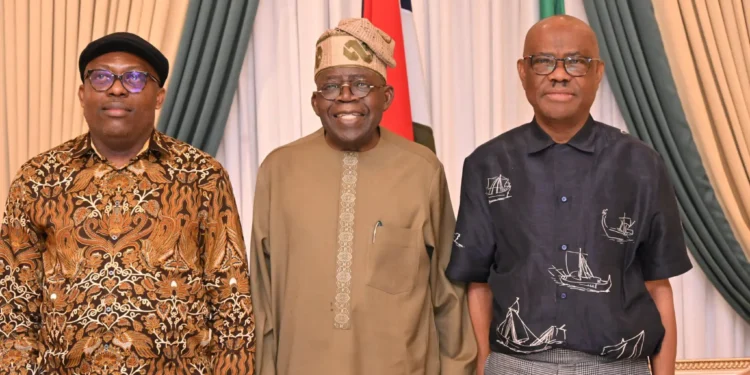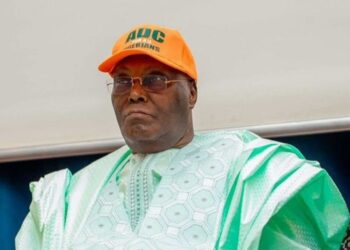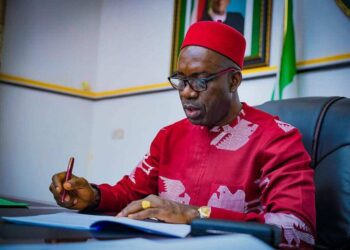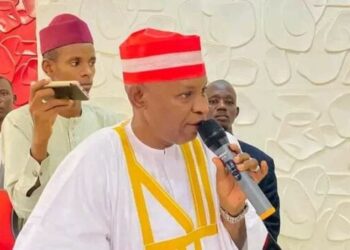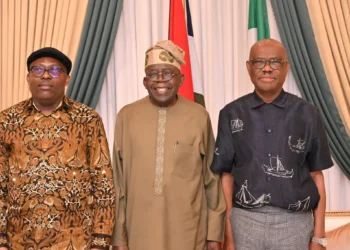President Bola Ahmed Tinubu has directed the Rivers State administrator to begin preparing his handover note for the return of state administration to suspended Governor Siminalayi Fubara next week, signaling a potential end to the six-month emergency rule that has gripped Nigeria’s oil-rich state.
A presidential source confirmed the directive to Quicktell News, revealing that President Tinubu gave the instruction to Vice Admiral Ibok-Ete Ekwe Ibas (Retired) during a meeting at the Presidential Villa before the President’s recent travels.
The development marks a significant turn in the Rivers State political crisis that has dominated national headlines since 2023, culminating in the unprecedented declaration of a state of emergency on March 18, 2025.
Background of the Rivers State Crisis
The political turmoil in Rivers State originated from a bitter fallout between Governor Siminalayi Fubara and his predecessor, Nyesom Ezenwo Wike, who currently serves as Minister of the Federal Capital Territory. Fubara, who was elected governor in March 2023 under the Peoples Democratic Party (PDP), was widely regarded as Wike’s chosen successor, but their relationship soured after Fubara assumed office.
The ongoing political crisis in Rivers State can be traced back to October 2023, when tensions between Governor Siminalayi Fubara and his predecessor, now the Federal Capital Territory (FCT) Minister Nyesom Wike, escalated. The conflict centered on control of the state’s political structures and resources, with both men vying for supremacy.
The crisis deepened in December 2023 when 27 lawmakers “defected” from the PDP to the APC, creating a constitutional crisis in the state legislature. This mass defection led to the emergence of factional speakers and a parallel assembly, further paralyzing governance in the state.
The situation deteriorated further in October 2024 when three local government secretariats were set ablaze in Rivers, highlighting the security implications of the ongoing political battle.
Declaration of State of Emergency
Faced with escalating tensions and governance paralysis, President Tinubu made the proclamation during a nationwide broadcast on Tuesday, March 18, 2025, citing his concern about the turn of events and the hope that parties involved would allow good sense to prevail.
In his broadcast, President Tinubu expressed his disturbance at the crisis, stating: “Like many of you, I have watched with concern the development with the hope that the parties involved would allow good sense to prevail at the soonest, but all that hope burned out without any solution to the crisis”.
By this declaration, the Governor of Rivers State, Mr Siminalayi Fubara, his deputy, Mrs Ngozi Odu and all elected members of the House of Assembly of Rivers State were suspended for an initial period of six months.
The President appointed former Chief of Naval Staff, Vice Admiral Ibok-Ete Ibas as administrator to oversee the state’s affairs during the emergency period.
National Assembly Endorsement and Opposition
The National Assembly, on Thursday, endorsed the state of emergency imposed on Rivers State by President Bola Tinubu. The resolution was taken at separate plenary sessions of the two chambers, providing the constitutional backing required for the emergency rule.
However, the declaration faced significant opposition from various quarters. Former federal lawmaker, Senator Babafemi Ojudu described President Bola Tinubu’s declaration of a state of emergency in Rivers State as a “reckless and unnecessary decision” that could have dire economic and security implications for the state and Nigeria at large.
Critics argued that Wike’s overbearing rent-seeking behaviour was the root cause of the crisis in Rivers State, questioning the federal government’s approach to resolving the dispute.
Recent Reconciliation Efforts
In recent months, there have been indications that reconciliation efforts between the feuding parties have yielded positive results. Wike recently stated: ‘The Coast Is Clear For The State Of Emergency To Be Lifted In Rivers’, suggesting that conditions for normalcy have been met.
President Tinubu had meetings with both Fubara and Wike among others as part of reconciliation efforts, with sources indicating that “they have reconciled” and that this was what many had been “praying for so that peace can be restored.”
Implications of the Handover Directive
The President’s directive to Vice Admiral Ibas to prepare handover notes represents the clearest indication yet that the emergency rule will end as scheduled. The six-month emergency period is set to conclude in mid-September 2025, making the timing of this directive significant.
For Governor Fubara, the anticipated return to office comes after months of suspension and legal battles. Kinsmen of suspended Governor Fubara from Opobo-Nkoro Local Government Area of the state have appealed to President Bola Tinubu to end the emergency rule, saying reversing the emergency rule would allow for diplomatic and justifiable resolutions of the lingering political crisis.
The development will be closely watched by political observers and Rivers State residents who have endured months of uncertainty and governance disruption. The successful resolution of the crisis could serve as a template for addressing similar political disputes in other states, while failure to maintain peace could reignite tensions in Nigeria’s most economically significant oil-producing state.
The handover process is expected to begin next week, marking what many hope will be the final chapter in one of Nigeria’s most protracted political crises in recent years.

